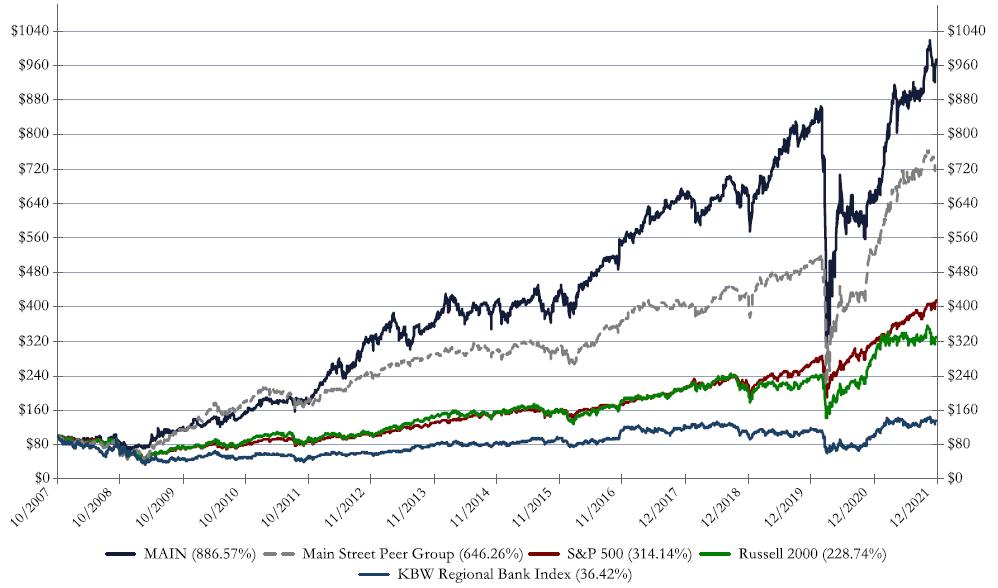other things, uncertainty surrounding the COVID-19 pandemic and the impact of supply chain disruptions. Despite actions of the U.S. federal government and foreign governments, these events have contributed to unpredictable general economic conditions that are materially and adversely impacting the broader financial and credit markets. These and future market disruptions and/or illiquidity would be expected to have an adverse effect on our business, financial condition, results of operations and cash flows, as well as the businesses of our portfolio companies, and the broader financial and credit markets.
At various times, such disruptions have resulted in, and may in the future result in, a lack of liquidity in parts of the debt capital markets, significant write-offs in the financial services sector and the repricing of credit risk. Such conditions may occur for a prolonged period of time again, and may materially worsen in the future, including as a result of U.S. government shutdowns, or future downgrades to the U.S. government's sovereign credit rating or the perceived credit worthiness of the U.S. or other large global economies. In addition, the current U.S. political environment and the resulting uncertainties regarding actual and potential shifts in U.S. foreign investment, trade, taxation, economic, environmental and other policies under the current Administration, as well as the impact of geopolitical tension, such as a deterioration in the bilateral relationship between the U.S. and China or an escalation in conflict between Russia and Ukraine, could lead to disruption, instability and volatility in the global markets. Unfavorable economic conditions also would be expected to increase our funding costs, limit our access to the capital markets or result in a decision by lenders not to extend credit to us. These events have limited and could continue to limit our investment originations, and limit our ability to grow and could have a material negative impact on our operating results, financial condition, results of operations and cash flows and the fair values of our debt and equity investments.
In addition, the U.S. and global capital markets have in the past, and may in the future, experience periods of extreme volatility and disruption during economic downturns and recessions. Trade wars and volatility in the U.S. repo market, the U.S. high yield bond markets, the Chinese stock markets and global markets for commodities may affect other financial markets worldwide. In addition, while recent government stimulus measures worldwide have reduced volatility in the financial markets, volatility may return as such measures are phased out, and the long-term impacts of such stimulus on fiscal policy and inflation remain unknown. Increases to budget deficits, which have been exacerbated by the COVID-19 pandemic, or direct and contingent sovereign debt may create concerns about the ability of certain nations to service their sovereign debt obligations and any risks resulting from any such debt crisis in Europe, the U.S. or elsewhere could have a detrimental impact on the global economy, sovereign and non-sovereign debt in certain countries and the financial condition of financial institutions generally. Austerity measures that certain countries may agree to as part of any debt crisis or disruptions to major financial trading markets may adversely affect world economic conditions, our business and the businesses of our portfolio companies.
Additionally, the Federal Reserve is expected to raise the Federal Funds Rate in 2022. These developments, along with the United States government’s credit and deficit concerns, global economic uncertainties and market volatility and the impacts of COVID-19, could cause interest rates to be volatile, which may negatively impact our ability to access the capital markets on favorable terms.
Deterioration in the economy and financial markets could impair our portfolio companies’ financial positions and operating results and affect the industries in which we invest, which could, in turn, harm our operating results.
The broader fundamentals of the United States economy remain mixed. In the event that the United States economy contracts, it is likely that the financial results of small to mid-sized companies, like those in which we invest, could experience deterioration or limited growth from current levels, which could ultimately lead to difficulty in meeting their debt service requirements and an increase in defaults. In addition, a decline in oil and natural gas prices would adversely affect the credit quality of our debt investments and the underlying operating performance of our equity investments in energy-related businesses. Consequently, we can provide no assurance that the performance of certain portfolio companies will not be negatively impacted by economic cycles, industry cycles or other conditions, which could also have a negative impact on our future results.
Although we have been able to secure access to additional liquidity, the potential for volatility in the debt and equity capital markets provides no assurance that debt or equity capital will be available to us in the future on favorable terms, or at all.
